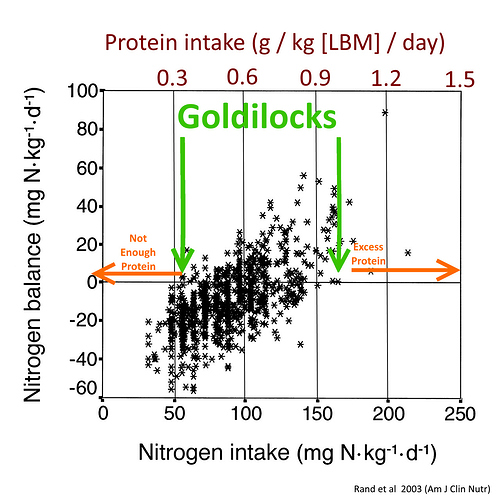There are as many dogmatic positions on protein as there are experts.
The following are all g/kg LBM
Dr Fung recommends a minimum of 0.6 and than an excess is not beneficial
Dr Rosedale recommends a minimum of 0.8 and than an excess is not beneficial
The Australian nrv.gov.au/nutrients/protein recommend 0.84 - 25% of caloric intake
Volek & Phinney on page 59 of art and science recommend 0.8 - 1.5 (no evidence that above 1.5 is beneficial)
Volek & Phinney on page 60 suggest 1.5-2.5 anecdotally improves performance of power athletes
Volek & Phinney on page 210 recommend 1.5-2.5
There are Coaches online that will tell you to eat protein until satiation (these are also usually lower fat diets)
Our own recommendation is between 1-1.5 based on the data underlying the nutrient reference values which looks like this
This shows a population of people eating different amounts of protein (measured as a function of their lean body mass) and measuring who were able to stay in nitrogen balance on the axis. In other words people on the 0 line are eating the right amount of protein to maintain their bodies. The range of protein necessary to achieve that ranges from 0.35 - 1.0 which if you think about it is a really large range.
Our guidance was designed at the lower end to have sufficient protein for all subjects in that study to have at least enough to maintain their bodies, and at the upper end following the guidance from Dr Phinney that no credible study had ever established that greater than 1.5 increased protein synthesis.
The other difference between ours, and some of these other opinions is that we are primarily aiming to resolve type 2 diabetes. All protein has an insulin cost which is higher for diabetics, so our advice is to not waste protein on calories and eat just enough for maintenance. But we have people here who only eat meat, and who thrive at relatively high amounts of protein…
As you can see from the underlying data the variance in the human need for protein is very broad and we’re all “snowflakes” and have to find out what works for us.




